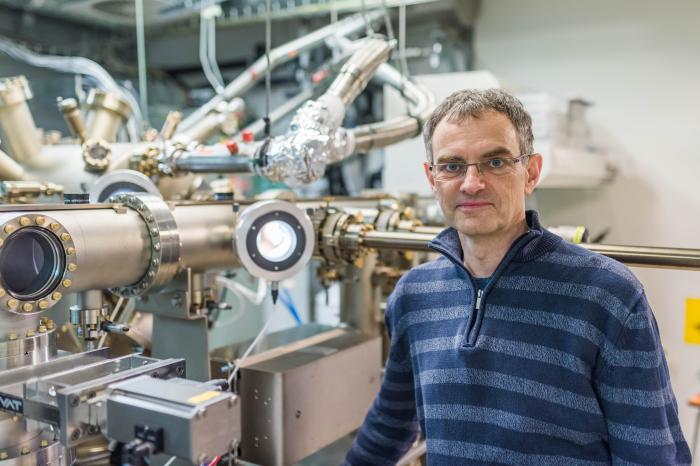Approximately only one percent of scientists in Europe succeed in obtaining a grant from the European Research Council, but Professor Tomáš Jungwirth from the Institute of Physics of the Czech Academy of Sciences has succeeded in a large competition for the second time. With his project Altermagnetism and spintronics without magnetization and relativity he has succeeded once again in the ERC Advanced grant category after twelve years and received the highest possible support of €2.5 million. The success rate for this type of grants was only 13.2% in 2022.
ERC Advanced grants are designed to support outstanding established senior researchers who have made a breakthrough discovery in the last ten years. In the case of Jungwirth and his colleagues at the Institute of Physics, this is the identification of a third fundamental class of magnetic order, called altermagnetic, which complements the traditional ferromagnetic and antiferromagnetic classes.
"Apart from the encouraging recognition of the scientific merit of our team’s discovery of altermagnetism, the ERC grant can have multiple practical positive effects on our team’s future research," said Tomas Jungwirth, Head of the Department of Spintronics and Nanoelectronics, commenting on the grant award.
ERC opens up more funding opportunities for the team
Not only can his team benefit from funding provided directly by the ERC, but several major national or international funding instruments list awarded ERC grants among important evaluation criteria. " With already a third ERC grant awarded to our team, we are in a strong position to compete for these key funding instruments which, together with this latest ERC grant, will allow us to coordinate broad international research activities in the emerging field of altermagnetism," explains Jungwirth. Last year, in his group, an ERC project of his colleague Jörg Wunderlich was completed, which focused on bridging the previously independent fields of organic semiconductors and spintronics in inorganic materials.
In the new ERC project, Professor Jungwirth will focus on altermagnets that can combine the advantages of ferromagnets and antiferromagnets, which were previously considered principally incompatible. At the same time, they have features that are unparalleled in either of the two traditional magnetic classes. The successful scientist and his group believe that they will underpin new research and development directions in spin physics, nanoelectronics and optoelectronics. Their goal is to explore the utility of altermagnets for ultrafast digital memory technologies and neuromorphic logic-in-memory technologies.
While in 2021 scientists from the Czech Republic were unsuccessful in their bids for an ERC Advanced grant, this year four grants are heading to the Czech Republic. Two of them are for the Jungwirth siblings, who are no longer subject to the uncompromising rules on conflicts of interest after Tomáš Jungwirth left the European Research Council's Scientific Council. The award of the ERC grant to Tomáš and Pavel Jungwirth also confirms, among other things, that the earlier support for their work by the Academic Award has fallen into the right hands.
Winning a second ERC grant in the Advanced category is extraordinary because the ERC does not support the prevailing continuation of existing work but requires fundamentally new ideas for each grant awarded.
Professor Tomáš Jungwirth has long been helping to support applicants for ERC calls in collaboration with Professor Zdeněk Strakoš from Charles University. Since January 2021, he has been serving on the expert group to support applicants in calls of the European Research Council, which operates at national level in cooperation with the Prague Technology Centre. "Winning a second ERC grant in the Advanced category is extraordinary because the ERC does not support the prevailing continuation of existing work but requires fundamentally new ideas for each grant awarded. Tomáš and Pavel Jungwirth set an example for the rest of us with their results and their support in creating a healthy scientific environment in the Czech Republic," said Professor Zdeněk Strakoš.
ERC grants at FZU
In 2011 Tomáš Jungwirth was successful in his application for an ERC Advanced grant, and two years later a member of his team, German scientist Jörg Wunderlich, Was awarded an ERC Synergy grant. The ERC Consolidator grant with the topic of magnetism was awarded to Jan Kuneš in 2014, but after two years he took advantage of the support transferability and transferred his grant to the Technical University of Vienna. In 2017, on the other hand, Constantinos Skordis, a Greek physicist who works in the field of astrophysics, came to the Institute with an ERC Consolidator grant. Currently, Dutch scientist Timotheus Verhagen, who received an ERC Starting grant during his previous tenure at the Faculty of Mathematics and Physics of Charles University, is currently working at FZU. In 2023, Tomáš Jungwirth was again successful in competing for an ERC Advanced grant.
